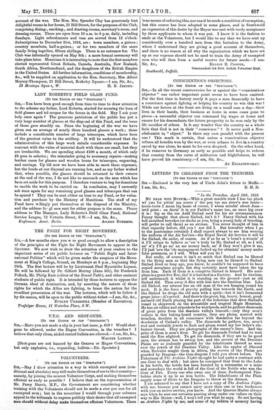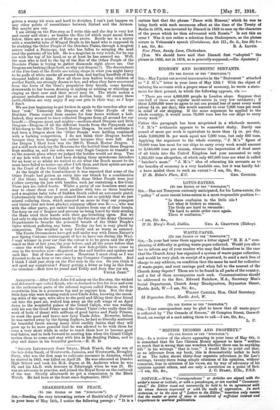LETTERS TO CHILDREN FROM THE TRENCHES.
[TO THE EDITOR OF THE " SPECTATOR:1
Sim —Enclosed is the very last of Uncle John's letters to Muffle.— " In the Trenches, April 28th, 1916.
MY DEAR WEE MITFFID,—Whit a great muokle craw I has tae pluok wi' you for pittin' ma warts o' the pen tae ma sister's wee lassie- hoots-toots I mean big lassie of coorse, I wisna mindin' aboot Jean- intil print : an daein' it in yer Faither's name tae, an unoo big craw it is : big as the roc Auld Sinbad used for his air reconnaissances. Funny thought that about Sinbad, isn't it ? Fancy Sinbad with his bell-mouthed breeches (or slacks as you, being a young lady of breeding, will prefer to call them) as an airman. You never thought of him in that capacity before, did you ? nor did L But hereafter when I go to the pantomime certainly I shall expect always to see him wearing the uniform of the Air Service—the Royal Naval Air Service it will be for Sinbad, the sailor, of course. An if so be as 'e bean't a-wearin' of it I'll refuse to believe as 'ow 'e truly be Mr. Sinbad at all, so I will, an' w'y I'll go an ax me money back, an' if they won't give it me, I'll just 'ave the 'ole management locked up for obtainin' money under false pretences, so I will. What will you do ? But really, of course it isn't so much that Sinbad can be likened to the flying men as that the flying men can be likened to Sinbad. Sinbad lived so long ago, you know, he couldn't be supposed to have copied aeroplane people, but they certainly must have taken the tip from him. Each of them is a complete Sinbad in himself. His aero- plane is a great live Roc, tho' it is hatched in a Factory. And he ties him- self underneath it whilst it is standing on the ground—just as old Sinbad did. Then away it flies with him into the limitless blue. Like old Sinbad, our airman has an old man of the sea hanging round his neck. It is the force of gravity pulling him towards the Earth, and like Sinbad he drugs the old man with a spirit—but it isn't fermented grape juice—it's petrol. And there is the great, big, heavy, honest, good- natured old Earth playing the part of the lodestone that drew Sinbad's vessel to shipwreck on the irresistible and tragical Magic Mountain. He has air eddies and airpookets for whirlpools, and he gathers diamonds of great price from the desolate valleys beneath—only they aren't valleys in this baking-board country, they are plains, scarred with trenches, desolate in all conscience with desolation far beyond the desolation of Sinbad's valley. The diamonds he gathers, too, aren't real and veritable jewels to flash and gleam round my fair ladye's ala- bastair throat. They are photographs of the enemy's lines. And the price of them is men's lives. To get his diamonds Sinbad had to wait until the Roo alighted. To get his diamonds, if they are to be good ones, the airman has to swoop low, and the secrets of the Desolate Plains are as jealously guarded by the inhabitants thereof as were ever the jewels of the Desolate Valley. Like the apples of Discord when Hercules sought them in Africa, the secrets of the Plains are guarded by Dragons—the Gun-dragons I told you about before. The Fisherman of The Arabian Nights thought he had quite a contract with one Geni to deal with : but since he consigned that Geni to the Lake in his bottle, the bottle has been bursted by a submarine or a mine and nowadays the world is full of the Geni of the Bottle who was the Geni of Fire. Every one who owns one of these Badtempered Fire- babies shuts it up in an iron bottle. The Inhabitants of the Plain supply some of theirs to the Dragons to throw at the Airmen. I am ashamed to say that I have not a copy of The Arabian Nights with me, because you cannot carry more than one or two bookcases with you on active service, you know. And the Quarter-Master always says when he sees our servants panting along under our valises on their way to His Stores—well, I won't tell you what he says. So not having an Arabian Nights by me, and some of my tablets of memory having gotten a weeny bit worn and hard to decipher, I can't just happen on any other points of resemblance between Sinbad and the Airman. But maybe you can. I am sitting on the Fire-step as I write this and the day is very hot and sunny and olear ; so besides the flies (of which more anon) down below, there are a number of Rocs up above. Beside me is a sentry with a wonderful tube of Winged Death in his hand who is supposed to be studying the Other People of the Desolate Plains, through a magical mirror called a Periscope, but who has fallen to scraping the mud (and the pattern) off his kilt. He is a magician in very truth, for he can see with the top of his head, or so at least he has assured me. Well, the man who is tied to the leg of the Roo of the Other People of the Desolate Plains is trying to gather diamonds right above me. Our Dragons are barking (dogs bark, so why not dragons ?). The descendants of the Fire Geni of the Bottle are taking shape in what you might fancy to be puffs of white smoke all around him, and hurling handfuls of iron shrapnel bullets at him. Now all these iron bullets being children of mother Earth, are strongly drawn to her, and when they have recovered from the force of the Geni's propulsive fiery breath, come hasting downwards to her bosom droning or sighing or sobbing or whistling or singing as their case and their mood may be. The whole makes a pleasant melodious sound just like an Aeolian harp. Of course these earth-children are very angry if any one gets in their way, so I hope I don't.
We are Just beginning to get broken in again to the trenches after our busy rest.' Yesterday the Dragons of the Other People of the Desolate Plains roared from sunrise for four hours without a halt. Indeed, they seemed to have collected Dragons from all around for our benefit :—Dragons great and mighty—medium-sized Dragons and little Dragons—Dragons of all the different breeds from the Pipsqueak and Whizzbang to the 200 lb. Trench Mortar Dragon. In Booth methinks it had been a Dragon show the Other People' were holding combineft with a barking competition. I do not think their Dragons barked because they were hungry but rather because they were fulL And the Dragon I liked least was the 200 lb. Trench Mortar Dragon. I got a stiff neck studying the Heavens for the bottled Geni these Dragons kept sending us, and our soles were very Magic Carpets to transfer us to the nearest place where we judged the bottles would not drop. Two of my lads with whom I had been dodging these unwelcome intruders for an hour or so whilst we waited to see what the Bosch meant to do, must have failed to notice one after I left them, and their spirits are now in the Court of the Great Caliph of the Universe.
At the height of the bombardment it was reported that some of the Other People had gotten an entry into our trench by a combination of (for them) lucky accidents. Well, these Other People were just raiders carrying tin jars with handles, each jar containing a fire Geni. These jars are called bombs. Whilst a party of our bombers went one way to chase them out I went another with two or three bombers and a magician baby tube of Sudden Death called an automatio pistoL Unfortunately the other party chased them out so quickly that we just missed collaring them, which annoyed us more in that our youngest and tiniest (but not least plucky) company officer wee R—, who was with the other party, got rather bad injuries from one of their bombs. Tee keep us oot o' languor and prevent us being bored by their strafing the Huns tried their hands with their gas-breathing ogres. But we had only to slip on the helmet made by the Fairies of the Army Chemical Departments to breathe the poisoned breath of the Other People's Ogres without suffering any harm. To-day (so far) is very placid by comparison. The weather is very lovely and as warm as summer. The Faerie Dressmakers have got well under way with Dame Nature's new Spring Costume (extravagant of her to have one during the War). I may whisper in your ear that the colour is to be green and the style much as that of last year, the year before, and all the years before that —since the world began. Hordes of new hob-goblins have come to stay in the trenches now—disguised as flies and beetles and spiders and such like. But of these more anon. Meantime I must sleep as I was directed to do an hour or two since by my Company Commander. And I think I shall just sleep on the Fire-step in the sun. Do you think it will spoil my complexion ? Fancy getting a letter as long as this from the trenches.—Best love to yerael and Teddy and Jean lase yer ain UNCLE JOHN."
ADDENDUM.—After Uncle John fell asleep on the fire-step, the wicked and deformed ogre called Kizah, who is doomed to live for ever and ever in the nethermost parts of the infernal regions called Prussia, tried to overwhelm him in a poisonous fog and so capture him. But the dear little fays who were keeping watch over Uncle John, knowing the sneak- ing wiles of the ogre, were alive to the peril and lifting their dear friend out into the pure air, wafted him away en the soft wings of an Aril dawn to the wonderful palace of the Grand Caliph, who was waiting with his son the Good Prince and the Grand Vizier (who really does the work of both of them) with millions of good fairies and Fairy Princes, to meet the good and brave new fairy Uncle John. However, before ho was carried away by the Spring Zephyrs, he had so liberally scattered his beautiful faerie among many little earthly fairies that they will grow up to be most grateful that he was allowed to be with them for even a very short while in order to teach them how to become good real fairies, and to look forward to meeting him when the Grand Caliph invites them to come and stay with him in his dazzling Palace, and to play and dance in his beautiful gardens.—E. H. D.
" SECOND LIEUTENANT Join; Sums., Black Watch, the only son of t he late John Small, of Wentworth, Jamaica, and Wentworth, Broughty Ferry, who was the first man to cultivate coconuts in Jamaica, which he started in 1853, was killed on April 29. He was educated at Dundee High School and took his M.A. degree at St. Andrews when he was 18, and his LL.B. with honours in Edinburgh when he was 21. He was an advocate in practice, and joined the Royal Soots on the outbreak of the war. Shortly afterwards he got a commission in the Black Watch. He had been at the front since September, 1915."































 Previous page
Previous page